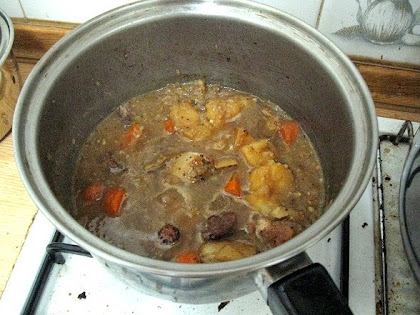Raw pork shoulder from a grass-fed oinker from a nearby An Xin Meat Shop was marinated with salt, black pepper, a clove of garlic, dark soya sauce (actually a 'sweet sauce' from a local brand with gula melaka) and McCormick's mixed herbs for 20 to 30 minutes and then seared in a hot pot with some oil.
Chopsticks are helpful when turning the pieces, if you can stand the splattering hot oil.
Then the two cloves of chopped garlic, chopped shallots (also two) and one red onion (roughly diced) went in, along with a bit of salt and black pepper, and are sautéed until brown. I then threw in some carrot and potato (skin on) and sautéed the lot for a short while, maybe three or four minutes.
I probably should have seared the root vegetables as well, so they don't fall apart too quickly when they stew. But the gravy may not be as nice and thick.
Then the meat went in, followed by some water and a tablespoon of light soya sauce; I learnt that you only need enough liquid to cover the pieces.
The whole lot is brought to a boil, then reduced to a REALLY LOW simmer for over an hour (at some point I stopped keeping track). Then I removed the lid and let it simmer for another half-hour (this I kept track of).
I returned to the pot every ten minutes or so to stir the contents, fearful of another crusty development at the bottom. Didn't happen this time; I have a four-burner stove, and I transferred the pot to a small one after the sautéing and set it to low (which I didn't do previously).
When the stew was almost done, I stirred in another tablespoon of light soya sauce (which was not as salty as some common brands) before pouring it into a bowl and mixed in a bit of olive oil.
(The bottom of the pot was near pristine this time, so I didn't have to scrub like crazy.)
Ladies and gentlemen, it's time for stew.
Delicious, though not as salty as some would like it. Didn't even use chicken stock cubes, as in Attempt #2 (so let us not speak of it again). Meat would've fallen off the bone if it had any; I think the searing also helped. Too bad I didn't have any rice or bread.
Will do this again. Soon.
Categories:
Epicurean Editor












